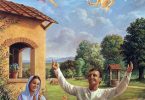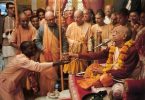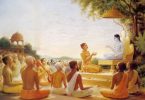Q: The purport of SB 9.22.20 states “Satyavati was actually the daughter of Uparicara Vasu by the womb of a fisherwoman known as Matsyagarbha. Later, Satyavati was raised by a fisherman.” What is that history?
Answer by Romapada Swami: The details of the following Puranic narration are not 100% consistent with the above passage, but very close.
King Uparicara Vasu was once with his wife; at that time his ancestors from Pitriloka appeared before him and requested he perform a sacrifice of a deer. So the King left his wife and went hunting. But whilst hunting, he suddenly felt it was an auspicious time for begetting children. He then requested a hawk which was on a tree to carry his seed to his wife. The hawk agreed and flew with his seed. The hawk was attacked by another hawk thinking this hawk was carrying meat in its mouth. Whilst fighting the seed from the hawk fell into the river Yamuna. At that time a fish swallowed the seed. This fish was formerly an apsara cursed by a brahmana and was now known as Matsyagarbha. So consequently she became pregnant. When she became pregnant, the apsara was released from the form of the fish and she left her fish body. However, the fish survived. The fish was caught by the King of the fisherman. Upon cutting open the fish, he finds twin children – a male and female children. He brings both children to King Uparicara who takes the male child and gives the female child to the fisherman king. The female child is named Matsyagandha (she was smelling like a fish).
Later Parasara Muni benedicts her with celestial fragrance etc.
In this way Satyavati is the daughter of King Uparicara and Matsyagarbha.
See also BBA 2.2.179
The personal form is realized by the Lord’s unalloyed devotees, but remains invisible to persons striving to realize impersonal Brahman. In addition, the personal aspect of the Supreme has special unique excellences, such as His distributing the topmost ecstasy of prema. This is shown in a narrative in the Sri Narayaniya of the Moksa-dharma where Uparicara Vasu performs a sacrifice in which he —but not Brhaspati and others— is able to see the Personality of Godhead accepting His share of the offerings.






